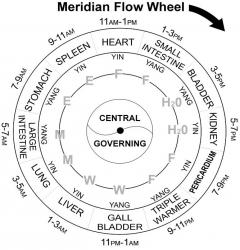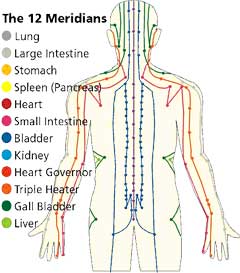
Meridians of the Body
Meridians of the body are undetectable to the naked eye, and yet we couldn’t live without them. They influence every organ and physiological system in the body. They carry energy throughout the body, much in the same way arteries carry blood. This energy is often referred to as chi, qi, or prana.
Meridians of the body are responsible for all the body’s major organ systems: endocrine, nervous, circulatory, immune, respiratory, skeletal, muscular, digestive, and the lymphatic systems. If the energy flowing through a meridian is imbalanced in any way, the system it fuels is jeopardized and disease results.
Through the flow of energy, meridians bring balance to the body. They remove energetic blocks, excesses and imbalances, regulate metabolism, and support cellular health. Their flow is as important as the flow of blood; your life and health rely on both.
There are 12 major meridians in the body:
- Lung
- Large intestine
- Spleen
- Stomach
- Heart
- Small intestine
- Bladder
- Kidney
- Pericardium (circulation/sex)
- Triple Warmer
- Liver
- Gallbladder
These meridians of the body are in control of not only their corresponding organ, but also additional organs around them. They play a specific and crucial role in the health of the entire system. Energetic imbalances on either side, whether meridians are energy deficient or energy excessive causes problems for the organ systems they regulate. Balance is key in the body and the energy in the meridians is no different.

The 12 Meridians Explained
Lung meridian
The lungs are responsible for both respiration and the intake of energy. If an imbalance in the lung meridian occurs it leaves the body open to viral and bacterial infections, as well as perspiration and inflammation issues in the upper parts of the body, problems with the olfactory organs (nose/sense of smell), and adverse skin conditions.
Large intestine meridian
The large intestine extracts water from waste material and processes it before expelling it. An imbalance of energy in the large intestine meridian is responsible for all abdominal pains. On an emotional level, an imbalance in large intestine energy manifests itself in difficulty with holding on or letting go.
Spleen meridian
The spleen distributes nutrients throughout the body. Because of this it affects muscle and limb tone, controls digestion, and helps regulate the flow of blood within the blood vessels. Energetic imbalances in spleen energy result in: abdominal problems (diarrhea, constipation, bloating), lack of appetite, prolapsed internal organs, weak muscles, and general fatigue. Imbalances in the spleen meridian can also cause brain fog and absentmindedness.
Stomach meridian
All digestive issues can be traced back to the stomach. The stomach’s main responsibility is to digest food, extracting energy from it and distributing that energy to the spleen and intestines. An imbalance in stomach meridian energy can lead to feelings of worry, nervousness, and a lack of acceptance.
Heart meridian
The heart distributes blood to all the organs in the body. An imbalance of energy in the heart meridian results in chest pains, palpitations, shortness of breath, dizziness, hot flashes/cold sweats, irritability and insomnia. A healthy heart meridian allows for joy and bliss in one’s life, while an imbalance can lead to psychological problems like anxiety, depression, and bipolar disorder.
Small intestine meridian
The small intestine is responsible for taking nutrients and energy that it has removed from food and distributing them throughout the body. An imbalance of small intestine energy causes poor circulation, weakness in the legs, always feeling cold, swollen lymph glands, sore/stiff shoulders, acne, nerve pain, poor digestion, and stomach distention.
Bladder meridian
The bladder removes liquid waste from the body. An imbalance in the bladder meridian is responsible for stiffness in the neck and shoulders, headaches, back pains, and all urinary diseases. Emotionally, an imbalance of bladder energy causes feelings of anger and an inability to express emotions.
Kidney meridian
The kidneys store sexual energy. Because of this they also regulate the growth and development of the reproductive system. In addition, the kidneys are also responsible for the production of bone marrow and blood. Therefore, an imbalance in kidney energy causes genital-urinary disorders, as well as backaches, asthma, and tinnitus. On an emotional level the kidney meridian controls willpower, determination, and a person’s ability to cope.
Pericardium (Circulation/Sex) meridian
The pericardium is the area surrounding the heart. The pericardium protects and lubricates the heart and the pericardium meridian removes excess energy from around the heart. This is important because it disperses energy throughout the body preventing the heart from becoming over-energized.
Triple Warmer meridian
The triple warmer controls the body as a whole. Rather than being responsible for a particular organ system, it controls metabolism, heat/moisture balance, and body temperature. Because the triple warmer is responsible for the whole body, an imbalance in triple warmer energy is associated with a wide range of disorders. An issue with any organ in the body is in some way associated to an imbalance in the triple warmer meridian
Liver meridian
The liver stores energy and regulates its flow throughout the body. The liver meridian is also responsible for the female sexual cycle and menstruation and the flexibility of tendons and ligaments. And imbalance of liver energy causes menstrual disorders like PMS, dry skin, jaundice, dry eyes, blurred vision, vertigo, stiff joints, and headaches. On and emotional level, an imbalance of energy in the liver meridian results in anger, irritability, depression, and a lack of control and emotional flexibility.
Gallbladder meridian
The gallbladder is responsible for storing and expelling bile produced by the liver. An imbalance of gallbladder energy causes bloating, liver pains, and a yellow discoloration on the tongue, skin, and in the urine.
What Are Acupuncture Points, or Energy Hot Spots?
Acupuncture points are commonly referred to when talking about meridians. Acupuncture points are “energy hot spots,” or places along the meridian where energy collects, making the chi, qi, or prana more accessible there.
Acupuncture points can be manipulated to increase or decrease the flow of energy in a particular meridian. When energy flowing through the meridians is blocked these points can be accessed to clear blockages. When there is too much energy flowing through a meridian or energy is stagnating in the meridian, acupuncture points can disperse the surplus of energy. Eastern forms of healing, such as acupuncture, acupressure, and Qi Gong are often used to relieve energetic imbalances.
Acupuncture and acupressure are very similar. They use the same points on the meridians in their healing, however, acupuncture accesses these points through needles while acupressure uses the less invasive technique of touch. Qi Gong is another form of Traditional Chinese Medicine. In qi gong meditation, breathwork and gentle movement cleanse and strengthen the meridians and the energy flowing through them.
Acupuncture, acupressure, and qi gong are all forms of what Western medicine calls preventative medicine. This does not mean that these techniques cannot be used as treatments; in fact, these are some the primary forms of treatment used in Eastern medicine. Healings involving the cleansing and balancing of energy flow have begun to gain recognition and popularity in the West, as well.
Qi Gong for Beginners
Original article and pictures take kirstennagy.hubpages.com site
Комментариев нет:
Отправить комментарий